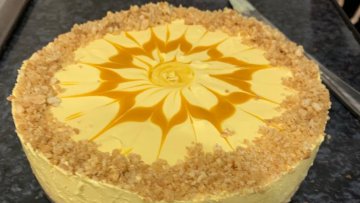10:00
An Introduction to Fusion Categories
Abstract
Motivation for the study of fusion categories is twofold: Fusion categories arise in wide array of mathematical subjects, and provide the necessary input for some fascinating topological constructions. We will carefully define what fusion categories are, and give representation theoretic examples. Then, we will explain how fusion categories are inherently finite combinatorial objects. We proceed to construct an example that does not come from group theory. Time permitting, we will go some way towards introducing so-called modular tensor categories.
Oxford Mathematician Katherine Staden talks about the mathematics of seating plans.
A topological approach to synchronization leads to explosive transition
Abstract
Synchronization is a collective phenomenon that pervades the natural systems from neurons to fireflies. In a network, synchronization of the dynamical variables associated to the nodes occurs when nodes are coupled to their neighbours as captured by the Kuramoto model. However many complex systems include also higher-order interactions among more than two nodes and sustain dynamical signals that might be related to higher-order simplices such as nodes of triangles. These dynamical topological signals include for instance fluxes which are dynamical variables associated to links.
In this talk I present a new topological approach [1] to synchronization on simplicial complexes. Here the theory of synchronization is combined with topology (specifically Hodge theory) for formulating the higher-order Kuramoto model that uses the higher-order Laplacians and provides the main synchronization route for topological signals. I will show that the dynamics defined on links can be projected to a dynamics defined on nodes and triangles that undergo a synchronization transition and I will discuss how this procedure can be immediately generalized for topological signals of higher dimension. Interestingly I will show that when the model includes an adaptive coupling of the two projected dynamics, the transition becomes explosive, i.e. synchronization emerges abruptly.
This model can be applied to study synchronization of topological signals in the brain and in biological transport networks as it proposes a new set of topological transformations that can reveal collective synchronization phenomena that could go unnoticed otherwise.
[1] Millán, A.P., Torres, J.J. and Bianconi, G., 2019. Explosive higher-order Kuramoto dynamics on simplicial complexes. Physical Review Letters (in press) arXiv preprint arXiv:1912.04405.
Mining learning analytics to optimise student learning journeys on the intelligent tutor, Maths-Whizz
A discussion session will follow the workshop and those interested are invited to stay in the meeting for the discussions.
Abstract
Maths-Whizz is an online, virtual maths tutor for 5-13 year-olds that is designed to behave like a human tutor. Using adaptive assessment and decision-tree algorithms, the virtual tutor guides each student along a personalised learning journey tailored to their needs. As students interact with the tutor, the system captures a range of learning analytics as an automatic by-product. These analytics, collected on a per-lesson and per-question basis, then inform a range of research projects centred on students' learning patterns. This workshop will introduce the mechanics of the Maths-Whizz tutor, as well as its related learning analytics. We will summarise the research behind four InfoMM mini-projects and present open questions we are currently grappling with. Maths-Whizz has supported over a million children and thousands of schools worldwide, from the UK and US to rural Kenya, the DRC and Mexico. In a world of social distancing and widespread school closures, the need for virtual tutoring has never been more paramount to children's learning - and nor has your data analytical expertise!
Kirchberg’s QWEP Conjecture: Between Connes’ and Tsirelson’s Problems
Part of UK virtual operator algebra seminar: https://sites.google.com/view/uk-operator-algebras-seminar/home
Abstract
In January of this year, a solution to Connes' Embedding Problem was announced on arXiv. The paper itself deals firmly in the realm of information theory and relies on a vast network of implications built by many hands over many years to get from an efficient reduction of the so-called Halting problem back to the existence of finite von Neumann algebras that lack nice finite-dimensional approximations. The seminal link in this chain was forged by astonishing results of Kirchberg which showed that Connes' Embedding Problem is equivalent to what is now known as Kirchberg's QWEP Conjecture. In this talk, I aim to introduce Kirchberg's conjecture and to touch on some of the many deep insights in the theory surrounding it.
Some examples of the Baum-Connes assembly map
Part of UK virtual operator algebras seminar: https://sites.google.com/view/uk-operator-algebras-seminar/home
Abstract
We will introduce the Baum-Connes conjecture without coefficients, in the setting of discrete groups, and try to explain why it is interesting for operator algebraists. We will give some idea of the LHS and the RHS of the conjecture, without being too formal, and rather than trying to define the assembly map, we will explain what it does for finite groups, for the integers, for free groups, and finally for wreath products of a finite group with the integers (the latter result is joint work with R. Flores and S. Pooya; it raises a few open questions about classifying the corresponding group C*-algebras up to isomorphism).
Cuntz semigroups
Part of the UK virtual operator algebras seminar: https://sites.google.com/view/uk-operator-algebras-seminar/home
Abstract
The Cuntz semigroup is a geometric refinement of K-theory that plays an important role in the structure theory of C*-algebras. It is defined analogously to the Murray-von Neumann semigroup by using equivalence classes of positive elements instead of projections.
Starting with the definition of the Cuntz semigroup of a C*-algebra, we will look at some of its classical applications. I will then talk about the recent breakthroughs in the structure theory of Cuntz semigroups and some of the consequences.
Expanders and generalisations
Part of the UK virtual operator algebras seminar: https://sites.google.com/view/uk-operator-algebras-seminar/home
Abstract
After recalling some motivation for studying highly-connected graphs in the context of operator algebras and large-scale geometry, we will introduce the notion of "asymptotic expansion" recently defined by Li, Nowak, Spakula and Zhang. We will explore some applications of this definition, hopefully culminating in joint work with Li, Vigolo and Zhang.




